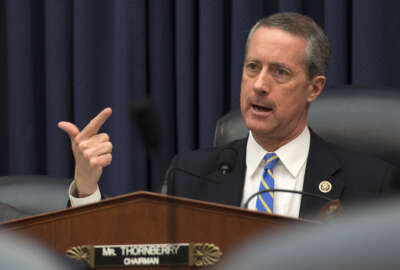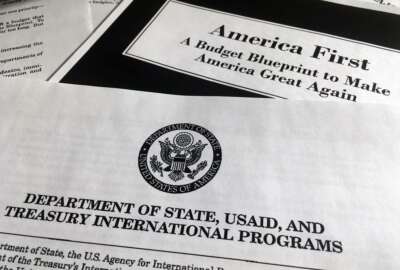
Generals warn about cuts to State Dept. budget; senator pushes to double it
The nation’s number-two military officer added himself to the list of Defense officials who’ve expressed unease about taking funds away from the State...
The nation’s number-two military officer added himself to the list of Defense officials who’ve expressed unease about taking funds away from the State Department as one way to pay for a $54 billion plus-up in military spending, saying the U.S. “cannot kill its way out of” problems like global extremism.
During a budget-focused speech at the Air Force Association Thursday, Gen. Paul Selva, the vice chairman of the Joint Chiefs of Staff, did not directly reference the Trump administration’s budget proposal for State, which would cut the department’s budget by $10 billion (28 percent) in 2018. But when asked about the cuts, he made clear he believes it would be unwise to underestimate the value of “soft power” in national security matters.
“I’m concerned, and I’ve expressed that concern,” he said. “If we make hard power the way the United States is perceived worldwide, our soft power will atrophy and we’ll actually have to rebuild the institutions we’ve spent so much time building in order to do the work we need to do.”
Selva, who, we should note, has some experience in the State Department after having served a three-year detail there during the Bush and Obama administrations, said concerns about diplomatic power are especially relevant to the fights in Iraq and Syria the U.S. is engaged in.
“Violent extremism will continue to exist for as long as their foundational elements continue to exist. Those are generally bad governance, disenfranchised populations, corruption, and police forces that show bias toward one side of that equation,” he said. “None of those are things the Defense Department is good at fixing.”
Gen. Curtis Scaparrotti, the commander of U.S. European Command, made similar remarks late last month when asked about cuts to State in the context of countering terrorism in Europe.
“It will make the job more difficult. I rely heavily on our relationships with the other agencies in our government. Within my headquarters, the State Department military adviser is essentially one of my deputies,” he said. “Our counter-transnational terrorism cell is predominantly agency personnel from State and Treasury. It’s not uniformed personnel that do those actions for EUCOM and the United States in Europe.”
It’s far from certain that cuts anywhere near the magnitude the administration has outlined would be approved on Capitol Hill. Democrats have widely opposed them, as have some Republicans, including Senate Majority Leader Mitch McConnell (R-Ky.) and Chairman of the Senate Armed Services Committee John McCain (R-Ariz.).
And last week, Sen. Chris Murphy (D-Conn.) introduced a proposal that would not only hold the line on State Department funding, but double it over the course of five years, in what he called a “Marshall Plan for the 21st Century.”
Speaking at the Atlantic Council, Murphy said he supported an increase in Defense spending, but that State needs a $50 billion boost too, given what he said was a 20-to-1 mismatch between military and intelligence spending, and diplomacy and development spending.
“We have more people working at military grocery stores today than we have diplomats in the State Department,” he said. “That’s insanity. In the global competition for foreign investment, China’s lapping us. Maybe it’s because our budget for public diplomacy around the world is $650 million. Theirs is $10 billion.”
Although he acknowledged the increases he’s calling for are politically unrealistic at the present moment, a report his office issued calls for a $100 billion State Department budget by 2022, with increases in everything from the Peace Corps to USAID and foreign aid, including a $10 billion annual budget for the Millennium Challenge Corporation, a State program that provides grants to poor countries as long as they demonstrate a commitment to good governance.
The report also notes that foreign aid is already at a 60-year low: 0.2 percent of GDP, compared to 3 percent in 1949.
“The success of the Marshall Plan wasn’t an accident,” Murphy said. “Spending money on building stability is national security investment, and it’s never been in greater need. We can’t continue playing the role of a global fire department, responding to crises only after they’ve developed into four-alarm blazes.”
In defending the State Department’s budget, Democratic lawmakers and advocacy groups have often brought up a 2013 quote by Defense Secretary James Mattis, then the commander of U.S. Central Command: “If you don’t fund the State Department fully, then I need to buy more ammunition ultimately. … The more that we put into the State Department’s diplomacy, hopefully the less we have to put into a military budget.”
And Mattis’ views on the matter don’t seem to have changed after he agreed to join the Trump administration.
“What you must always have is a team of people together who are looking at all of the options,” he said during his January confirmation hearing. “You don’t default to one — particularly the military one — prematurely, you have your diplomats and everyone in the room as we are looking for every possible solution. What the military can do is provide the strongest deterrent so our diplomats can try to find a non-military option. It’s the peace through strength idea, and that’s my overarching approach.”
Return to the DoD Reporter’s Notebook
Copyright © 2025 Federal News Network. All rights reserved. This website is not intended for users located within the European Economic Area.
Jared Serbu is deputy editor of Federal News Network and reports on the Defense Department’s contracting, legislative, workforce and IT issues.
Follow @jserbuWFED





